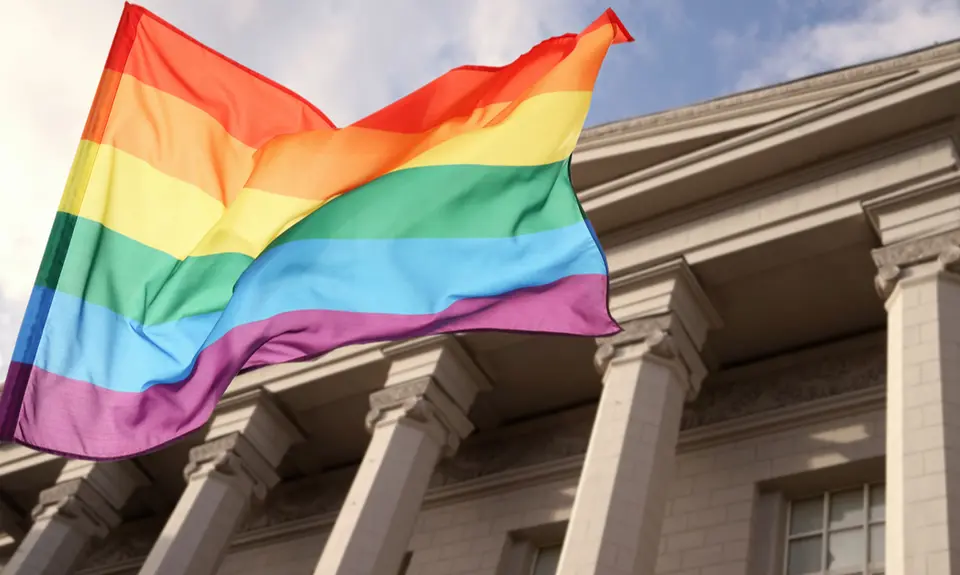On March 7, the U.S. Court of Appeals for the Sixth Circuit issued its opinion in E.E.O.C. v. Harris Funeral Homes, ruling that Aimee Stephens' rights were violated when she was fired for living and dressing consistent with her gender identity. This is not only a win for Stephens and LGBTQ equality but also for religious freedom and the idea that it not be used as a license to discriminate. In fact, this was the first court of appeals decision that considered and rejected a claim that the Religious Freedom Restoration Act could be used to excuse anti-LGBTQ discrimination. People For the American Way Foundation joined with organizational allies and clergy members and last year filed a friend-of-the-court brief in the case. Our brief’s introduction follows below. Click here to download a PDF copy of the full April 2017 brief.
Aimee Stephens lost her job of six years—her vocation and her livelihood—because she did not conform to her boss’s views on sex roles and gender identity.
As a matter of law, “[s]ex stereotyping based on a person’s gender nonconforming behavior is impermissible discrimination, irrespective of the cause of that behavior.” Smith v. City of Salem, 378 F.3d 566, 575 (6th Cir. 2004). Hence, firing Stephens, a transgender employee, for “failure to conform to sex stereotypes” (Barnes v. City of Cincinnati, 401 F.3d 729, 737 (6th Cir. 2005)) violated Title VII’s prohibitions against sex discrimination (see, e.g., id.; Smith, 378 F.3d at 575). The court below acknowledged this binding precedent, correctly concluding that the EEOC had stated a valid sex-stereotyping claim. R. 76, Opinion & Order Mots. Summ. J., PageID #2197– 98.
But the defendant mortuary asserted that it had a religious motivation for firing Stephens and argued that the Religious Freedom Restoration Act exempts for-profit corporations from otherwise-applicable antidiscrimination laws whenever their unlawful actions are based on or reflect religious belief. Hence, the mortuary contended, Title VII’s bar on sex discrimination cannot be enforced against it because the mortuary owner’s views about what men and women ought to look like are informed by his faith. The court below agreed, adopting an unprecedented interpretation of RFRA that allows for-profit employers to flout federal employment-discrimination law.
That interpretation cannot be correct. Amici agree with the EEOC and the Intervenor that prohibiting the mortuary from firing Stephens serves the compelling governmental interest of combatting sex discrimination in the workplace, and that it does so using the least restrictive means. But this Court need not reach those questions to decide this appeal, because RFRA is inapplicable as a matter of law; and even if it were applicable, the mortuary failed to satisfy RFRA’s statutory prerequisites.
- The Supreme Court has made clear that when analyzing religious exemptions from generally applicable laws—including RFRA, its sister statute the Religious Land Use and Institutionalized Persons Act, 42 U.S.C. §§ 2000cc et seq., and accommodations sought thereunder— “courts must take adequate account of the burdens a requested accommodation may impose on nonbeneficiaries.” Cutter v. Wilkinson, 544 U.S. 709, 720 (2005). To do otherwise would violate the Establishment Clause. Id. This constitutional limitation prohibits providing a religious exemption, under RFRA or otherwise, when, as here, it would impose meaningful harms on third parties.
- Even if RFRA could be applied here, the mortuary failed to satisfy RFRA’s prerequisite. When a party asserts a RFRA claim or defense, it bears the legal burden to show that the challenged governmental action places a “substantial[ ] burden” on the party’s “exercise of religion.” 42 U.S.C. § 2000bb-1(b). Only if the RFRA claimant first successfully makes that showing does the legal burden shift to the government to justify its behavior as narrowly tailored to serve a compelling interest. Here, the precondition is not met: Being forbidden to fire an employee because she does not conform to one’s religious beliefs about how men and women are supposed to dress is not a legally cognizable substantial burden on one’s religious exercise. Hence, the compelling-interest test is not triggered, and the mortuary’s RFRA defense fails at the outset.
* * *
Were the district court’s decision to stand, for-profit businesses would have broad—indeed, nearly limitless—license to engage in unlawful and invidious discrimination through a simple expedient: describing their discrimination as religiously based. Employers could prohibit employees from becoming pregnant out of wedlock, refuse to place women in managerial positions, or require employees to wear the symbols of the employer’s religion—and fire those who do not comply. RFRA provides important safeguards for religious exercise. But it does not and cannot upend all employment-discrimination law. The district court’s decision should be reversed.
